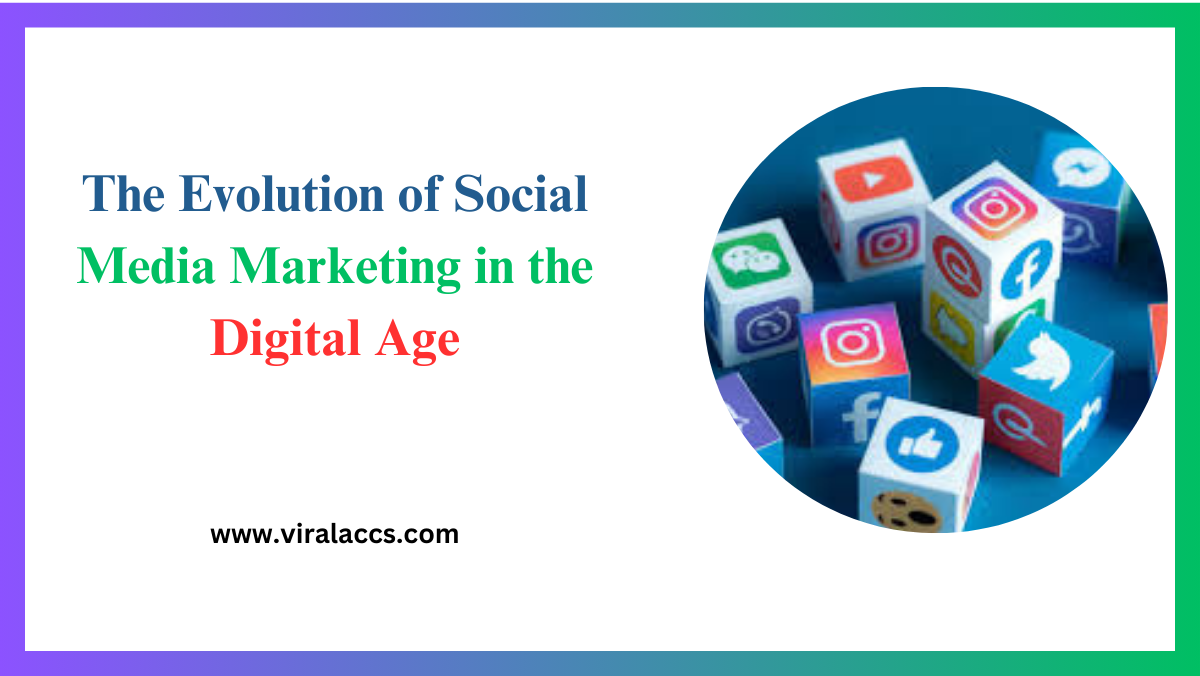The realm of social media marketing has dramatically transformed from a niche tactic to a vital business strategy. Today, it’s hard to imagine a world without social platforms influencing every aspect of our lives. This blog post aims to unravel the fascinating evolution of social media marketing, highlighting key milestones, current trends, and future predictions. For marketers and business owners, understanding this evolution can provide valuable insights into leveraging social media for maximum impact.
Brief History of Social Media Marketing
Social media marketing wasn’t always the juggernaut it is today. Back in the early 2000s, platforms like MySpace and Friendster were among the first to introduce users to the idea of social networking. These platforms laid the groundwork for what would become an entirely new marketing paradigm. Initially, businesses were hesitant to invest in social media, viewing it primarily as a platform for personal interactions rather than a viable marketing channel.
It wasn’t until Facebook launched its Pages feature in 2007 that businesses began to see the potential of social media for brand engagement. Soon after, Twitter introduced promoted tweets, and LinkedIn offered advertising options, further solidifying social media’s role in the business world. These developments marked the beginning of a shift where companies started to see social media as a critical tool for marketing and customer engagement.
The turning point came with the rise of smartphones and mobile internet access. Suddenly, social media was at everyone’s fingertips, and platforms like Instagram and Snapchat emerged, focusing on visual content. The stage was set for a new era of marketing, where businesses could engage with their audience in real-time and create more dynamic, interactive content.

Key Milestones in Evolution
Several key milestones have significantly shaped the landscape of social media marketing. In 2010, Facebook introduced the “Like” button, which revolutionized how brands measure engagement. This simple feature allowed users to express their approval of content, providing businesses with valuable feedback and metrics.
The introduction of Instagram in 2010 added another layer to social media marketing. Its focus on visual content appealed to a younger demographic and offered brands a new way to showcase their products. Instagram’s success paved the way for influencer marketing, where individuals with large followings promote brands in exchange for compensation.
In 2016, the launch of Instagram Stories and the subsequent introduction of Facebook Stories marked another significant milestone. These features allowed users and brands to share content that disappears after 24 hours, creating a sense of urgency and exclusivity. Stories quickly became a popular format for engaging audiences, offering a more casual and authentic way to connect.
Another major development was the advent of social commerce. Platforms like Facebook, Instagram, and Pinterest introduced shopping features that allowed users to purchase products directly from the app. This integration of e-commerce and social media created a seamless shopping experience and opened new revenue streams for businesses.
Current Trends and Innovations
The current landscape of social media marketing is characterized by rapid innovation and changing consumer behaviors. One of the most notable trends is the rise of video content. Platforms like TikTok and YouTube have demonstrated the power of short-form and long-form video in capturing audience attention. Brands are increasingly investing in video marketing to tell their stories and showcase their products in engaging ways.
Another trend is the growing importance of personalized content. With advancements in artificial intelligence and machine learning, brands can now deliver highly targeted content to specific audience segments. This level of personalization enhances user experience and increases the likelihood of conversions.
User-generated content (UGC) is also gaining traction as a powerful marketing tool. Encouraging customers to create content around a brand fosters a sense of community and authenticity. UGC not only boosts engagement but also acts as social proof, influencing potential customers’ purchasing decisions.
Influencer marketing continues to evolve, with micro-influencers playing a more prominent role. These influencers have smaller but highly engaged followings, making them valuable partners for brands looking to reach niche audiences. Collaborations with micro-influencers often yield higher engagement rates and more authentic connections.
Predictions for the Future
Looking ahead, several predictions can be made about the future of social media marketing. One of the most anticipated developments is the increased integration of augmented reality (AR) and virtual reality (VR) into social platforms. These technologies offer immersive experiences that can revolutionize how brands interact with their audiences. Imagine trying on clothes virtually or attending a virtual concert within a social media app.
Another prediction is the continued growth of social commerce. As consumers become more comfortable shopping through social media, platforms will likely introduce more advanced shopping features. AI-powered chatbots and virtual shopping assistants could become standard, providing personalized shopping experiences in real-time.
Privacy concerns and data protection will also shape the future of social media marketing. With increasing scrutiny on data collection practices, platforms will need to prioritize transparency and user consent. Brands will have to adapt to new regulations and find innovative ways to build trust with their audience.
The rise of decentralized social networks is another trend to watch. These platforms operate on blockchain technology, giving users more control over their data. While still in their early stages, decentralized networks could disrupt the current social media landscape and offer new opportunities for marketing.
Embracing Innovation
As the social media landscape continues to evolve, brands that embrace innovation and adapt quickly will maintain a competitive edge. Real-time engagement remains crucial, with consumers expecting immediate responses to their inquiries and feedback. Implementing chatbots and automated response systems allows brands to meet this demand while providing seamless customer service.
Interactive content is poised to become increasingly significant, offering brands unique opportunities to engage users through polls, quizzes, and live-streaming events. These interactive elements invite participation, making users feel more involved with the brand and fostering stronger connections.
Brands must also focus on enhancing the storytelling aspects of their campaigns, crafting narratives that resonate with their audience on a deeper level. Authentic, compelling stories create emotional connections that can transform followers into brand advocates.
Sustainability and corporate social responsibility will play an essential role in shaping brand perception. Consumers are becoming more conscious of the social and environmental impact of the corporations they support. Brands that demonstrate commitment to ethical practices and transparency can differentiate themselves positively in the marketplace.
By staying attuned to these emerging trends and continuously innovating, brands can navigate the future of social media marketing successfully, ensuring they not only reach their target audiences but also engage them in meaningful, impactful ways.
Leveraging Data-Driven Insights
Data analytics will continue to be a cornerstone in the evolution of social media marketing. As brands strive to understand their audiences more deeply, leveraging data-driven insights becomes essential. By analyzing consumer behaviors, preferences, and engagement patterns, brands can tailor their strategies to meet the specific needs and interests of their target demographics.
This data-centric approach allows marketers to optimize content, improve campaign performance, and measure ROI with greater accuracy. Furthermore, the utilization of predictive analytics can provide foresight into upcoming trends, enabling brands to stay ahead of the competition by anticipating shifts in consumer demands and adjusting their strategies proactively.
In an era where personalization is key, data-driven decision-making will empower brands to deliver more relevant and impactful interactions with their customers.
Collaborative Content Creation
The role of collaboration in content creation cannot be understated in the evolving landscape of social media marketing. By partnering with other brands, creators, and influencers, companies can expand their reach and tap into new audiences.
Co-created content often brings diverse perspectives and authentic voices that resonate more deeply with viewers, enhancing relatability and engagement. These collaborations can take many forms, ranging from co-hosted live events to joint promotional campaigns. Not only do these partnerships amplify a brand’s message, but they also foster a sense of community and shared value among audiences.
As consumers increasingly seek authenticity and shared experiences, collaborative content strategies will become a key component for brands looking to maintain relevancy and deepen their impact in the competitive digital space.
Conclusion and Insights
The evolution of social media marketing has been nothing short of revolutionary, transforming how businesses connect with their audience. From the early days of MySpace to the immersive experiences of AR and VR, social media has continually adapted to meet changing consumer expectations. For business professionals and organizations, staying abreast of these developments is crucial for maintaining a competitive edge.
Understanding the history and key milestones of social media marketing provides valuable context for navigating the current landscape. By leveraging trends like video content, personalization, and user-generated content, brands can create more engaging and effective marketing strategies.
Looking to the future, the integration of advanced technologies and increased focus on privacy will further shape the industry. By staying informed and adaptable, businesses can harness the power of social media to drive growth and build lasting relationships with their audience.
Ready to take your social media marketing to the next level? Explore our latest tools and resources to enhance your strategy and connect with your audience in meaningful ways.








